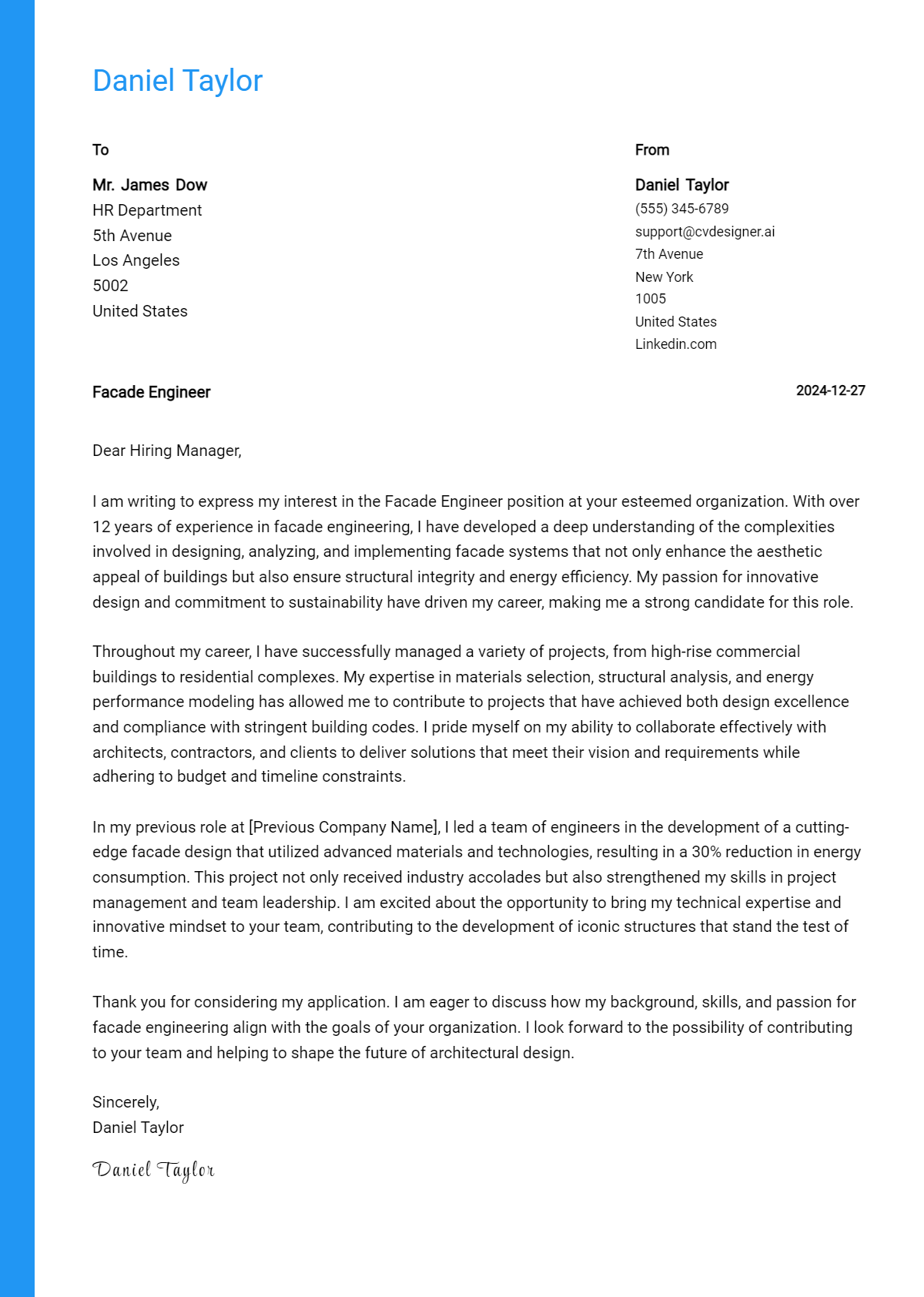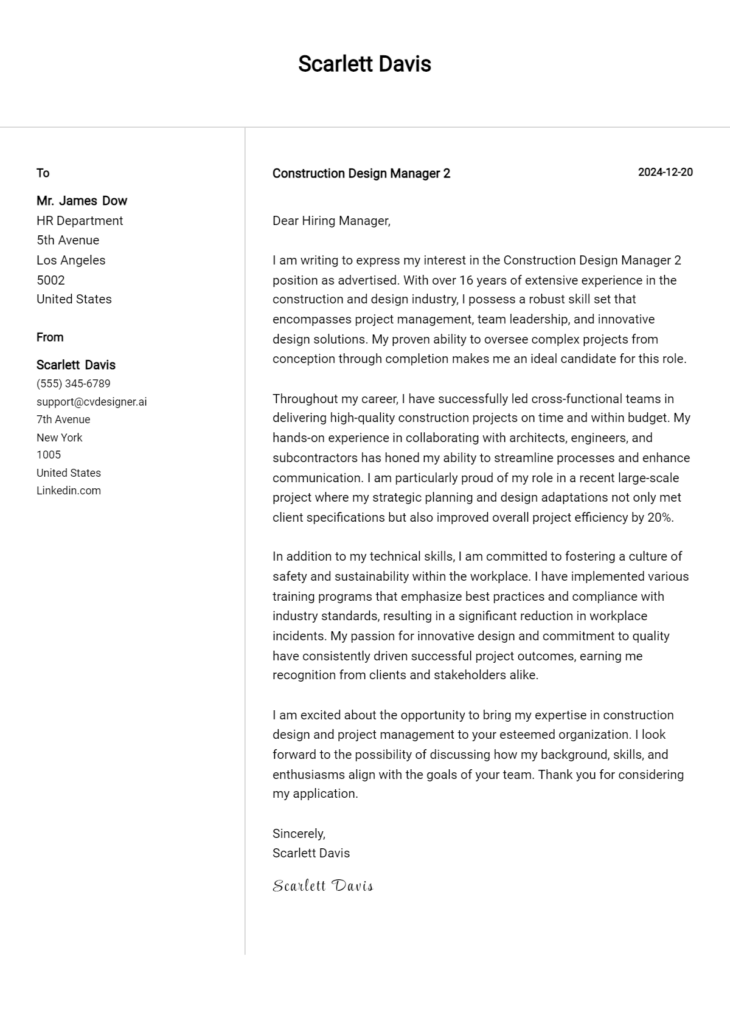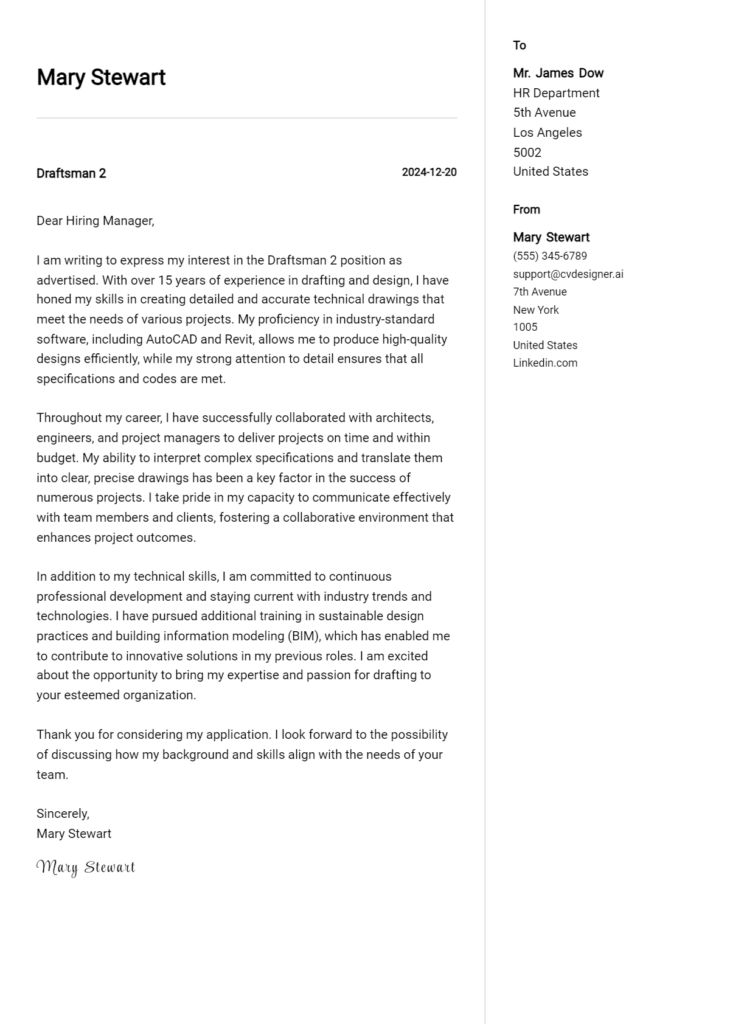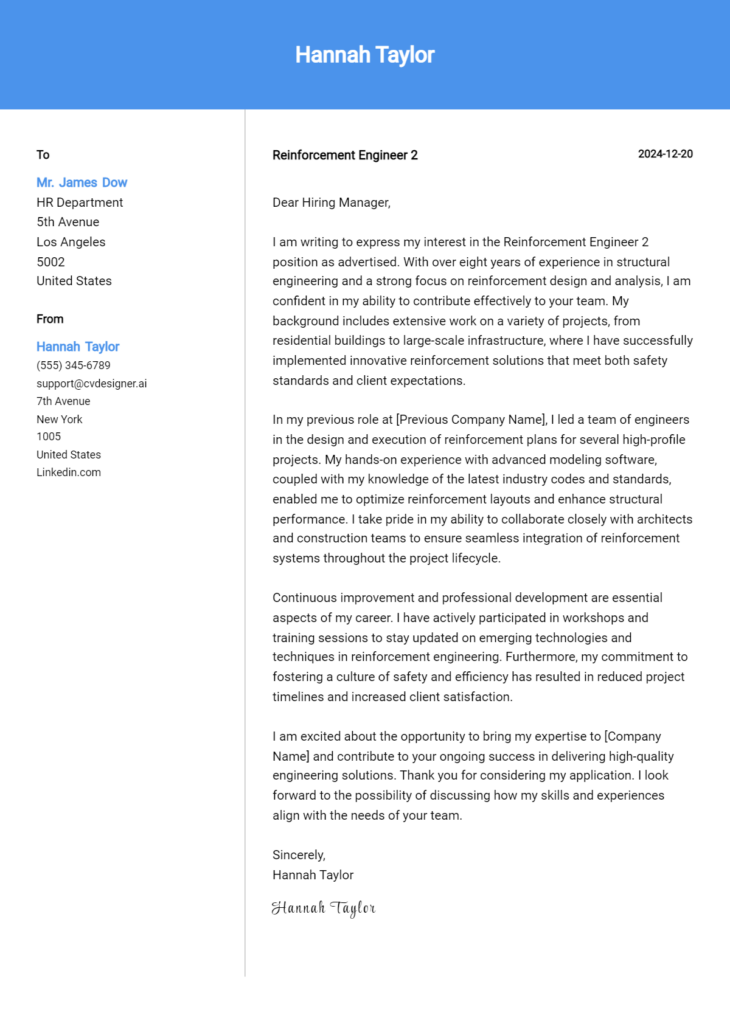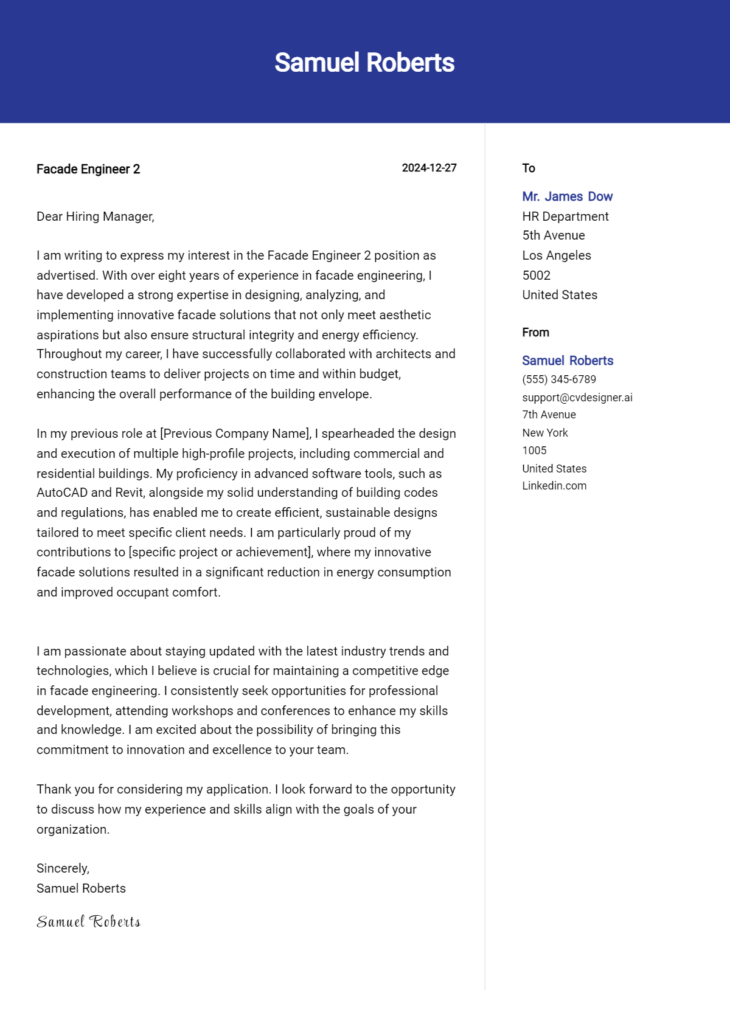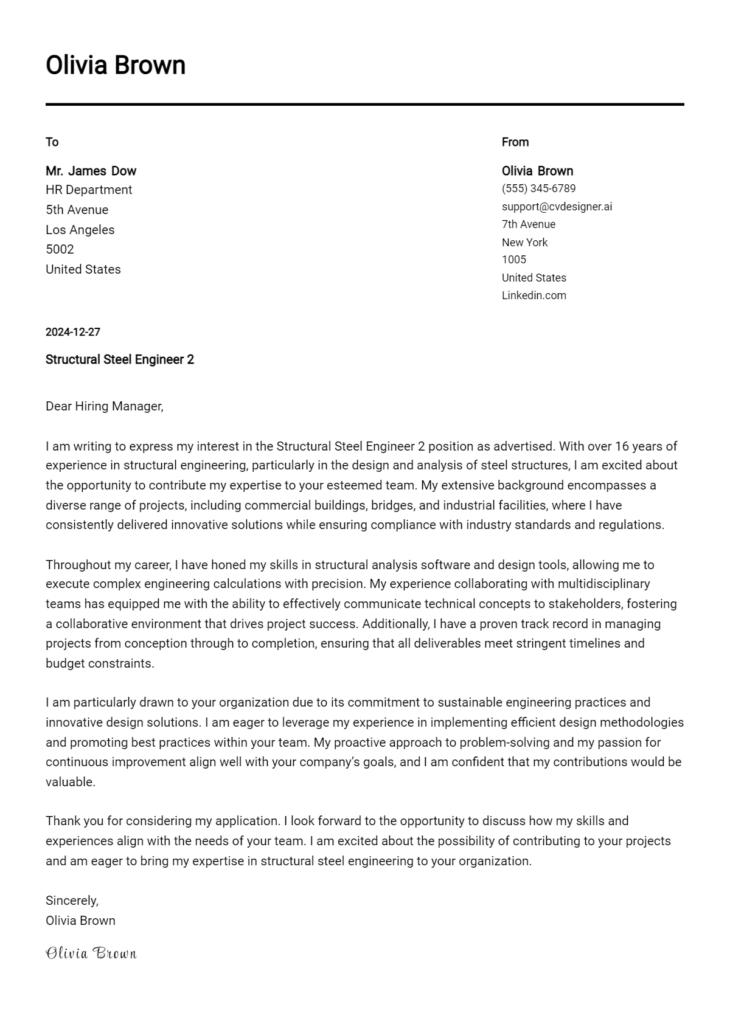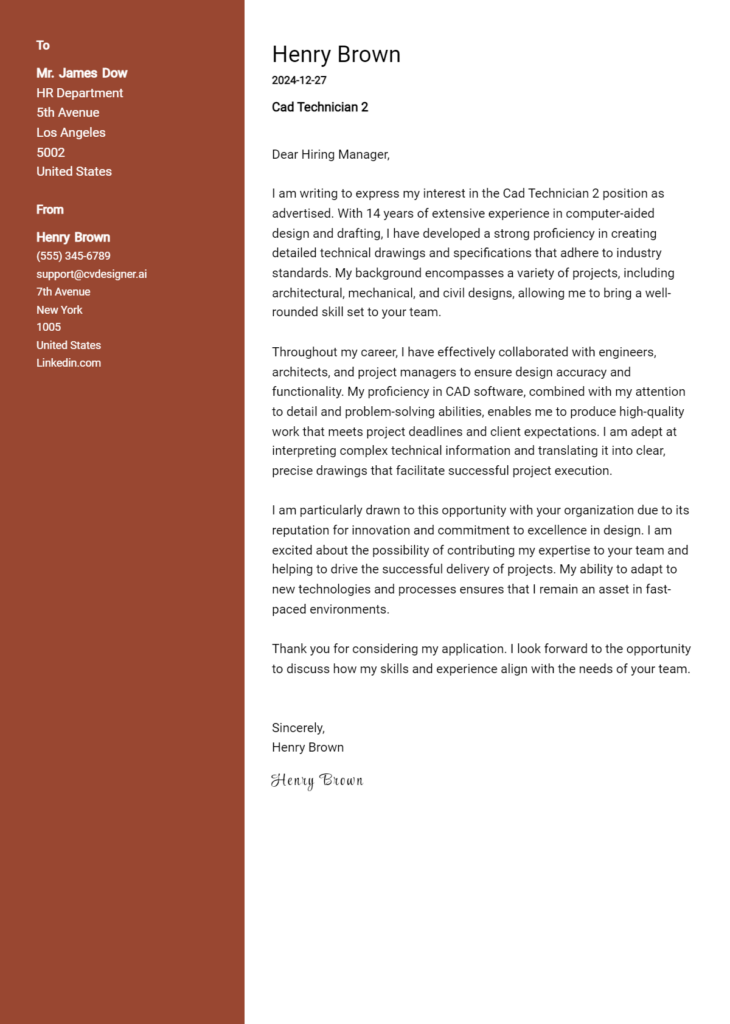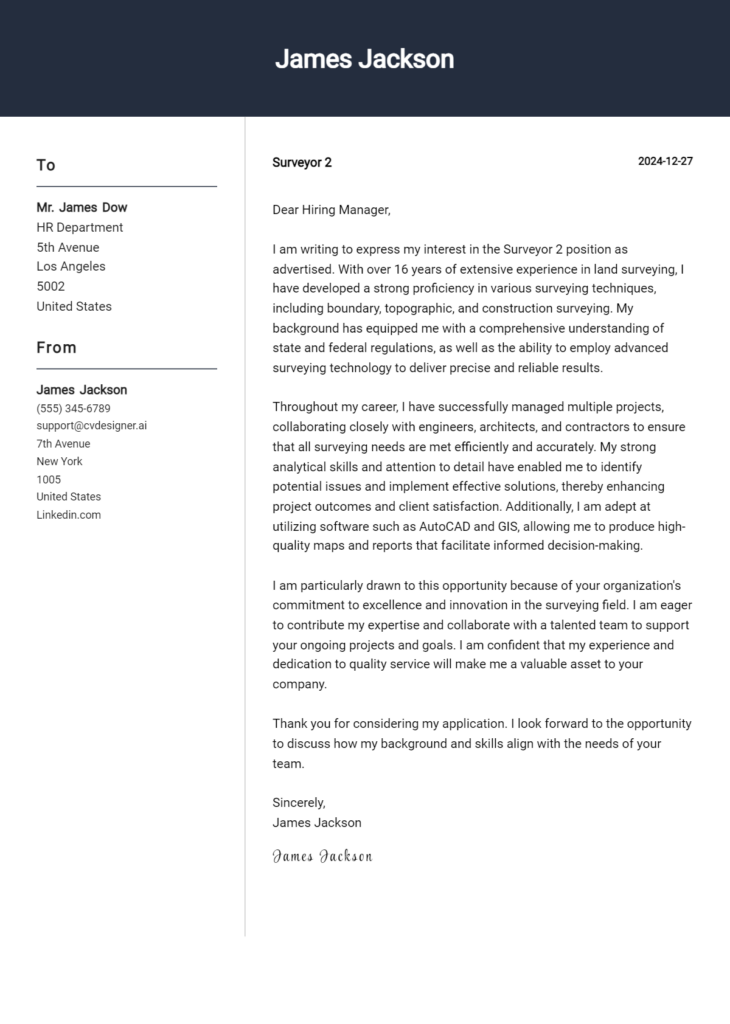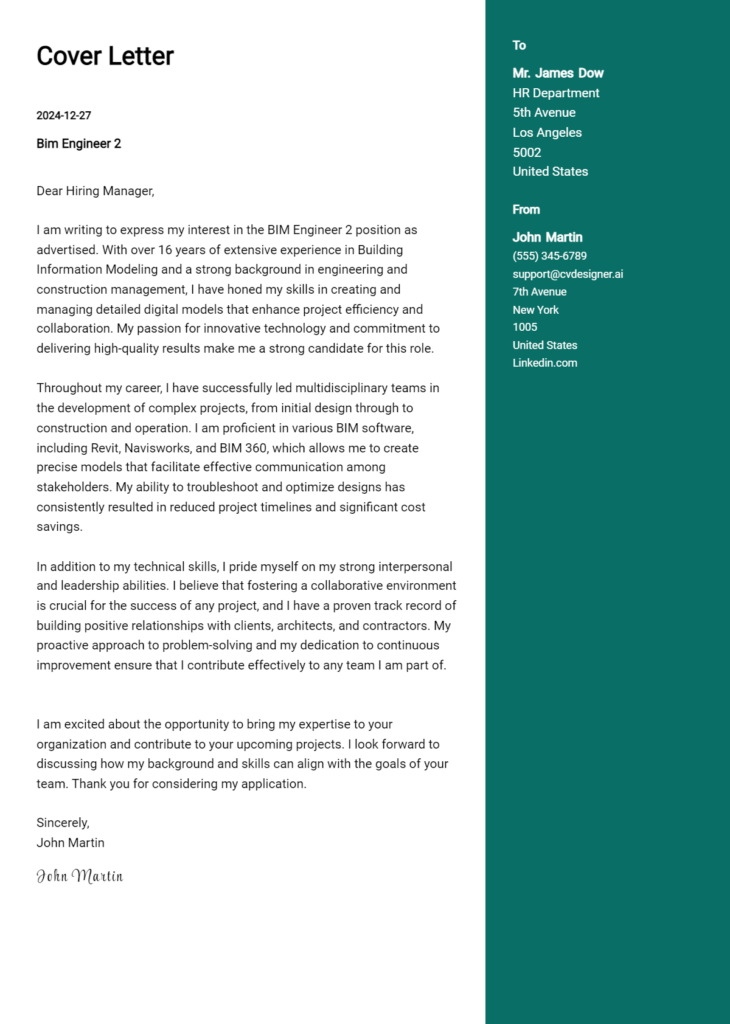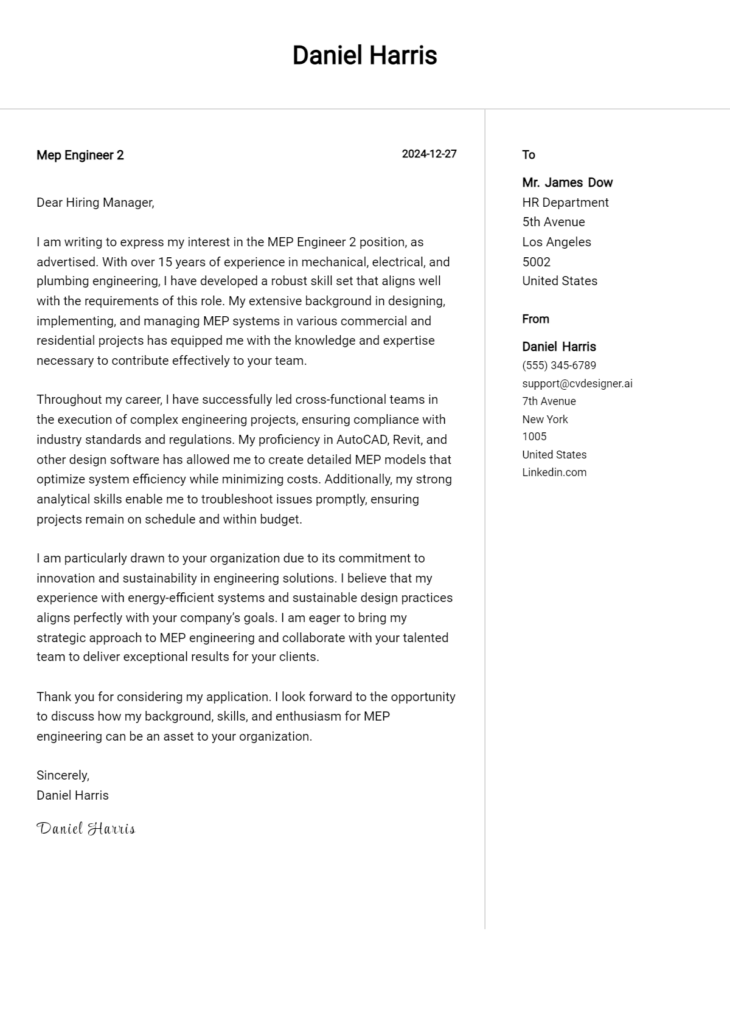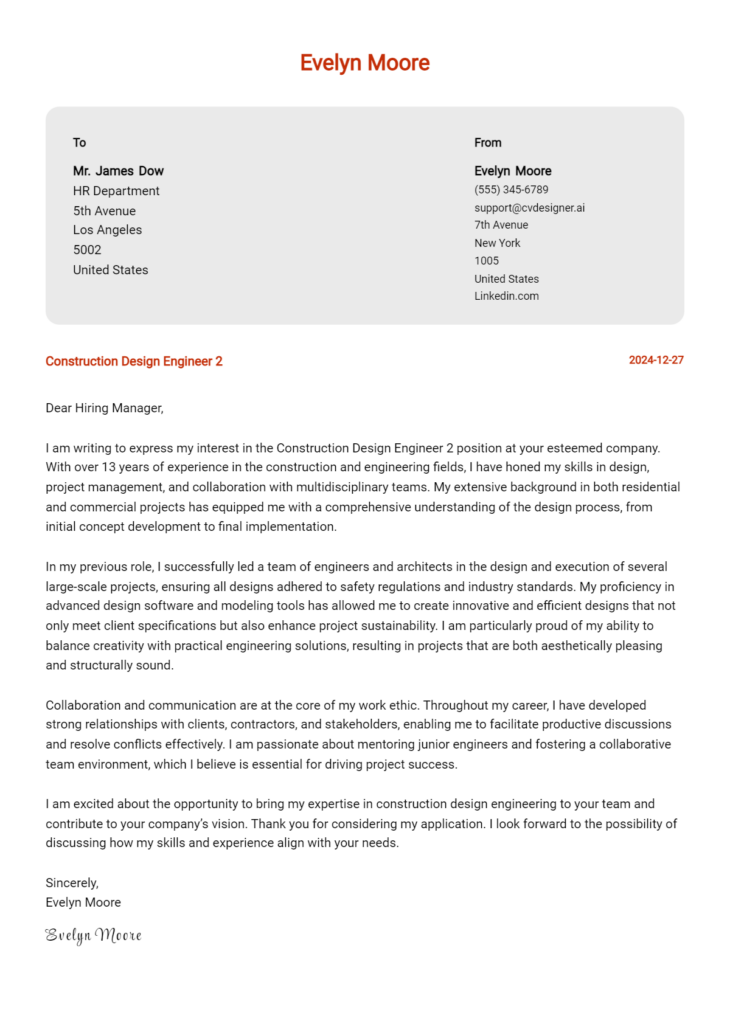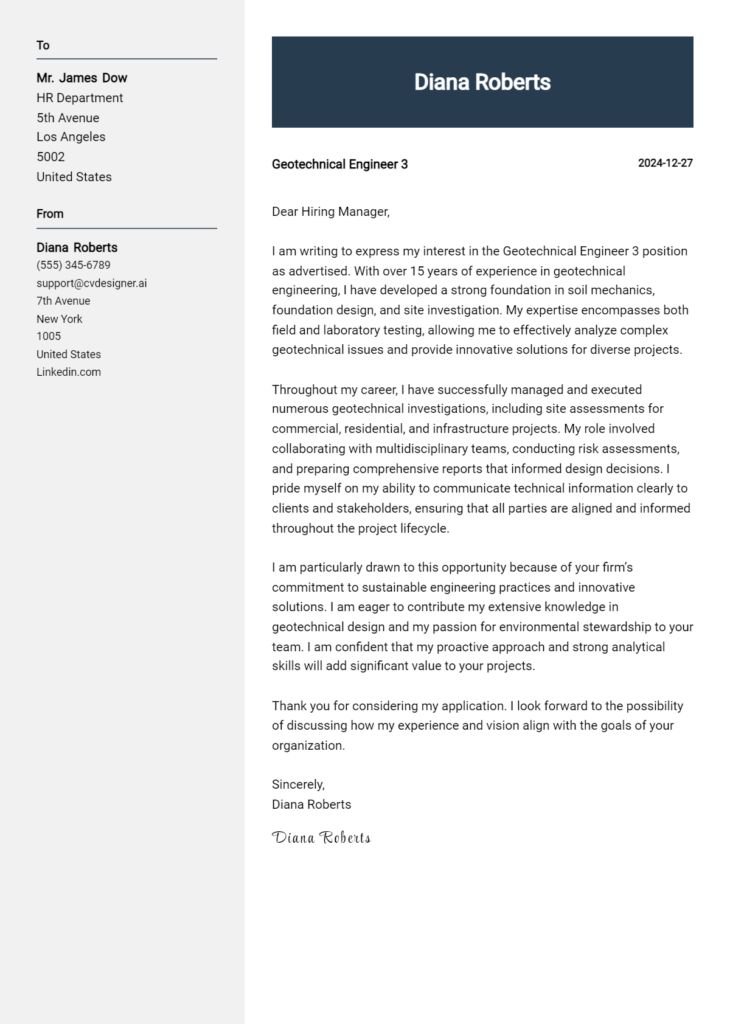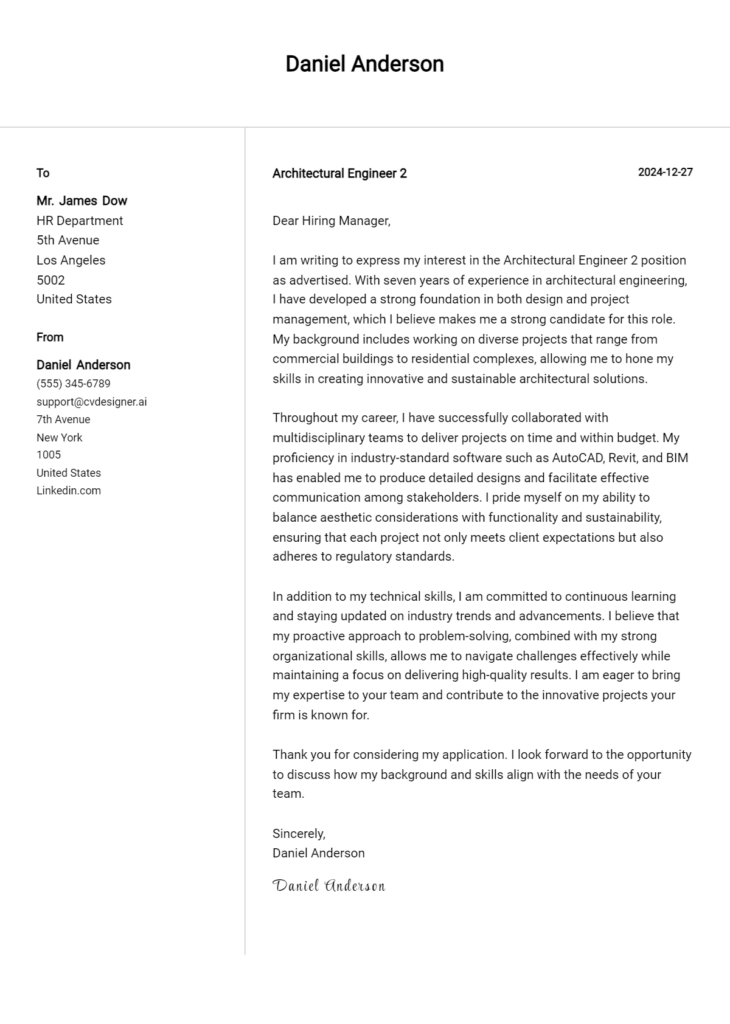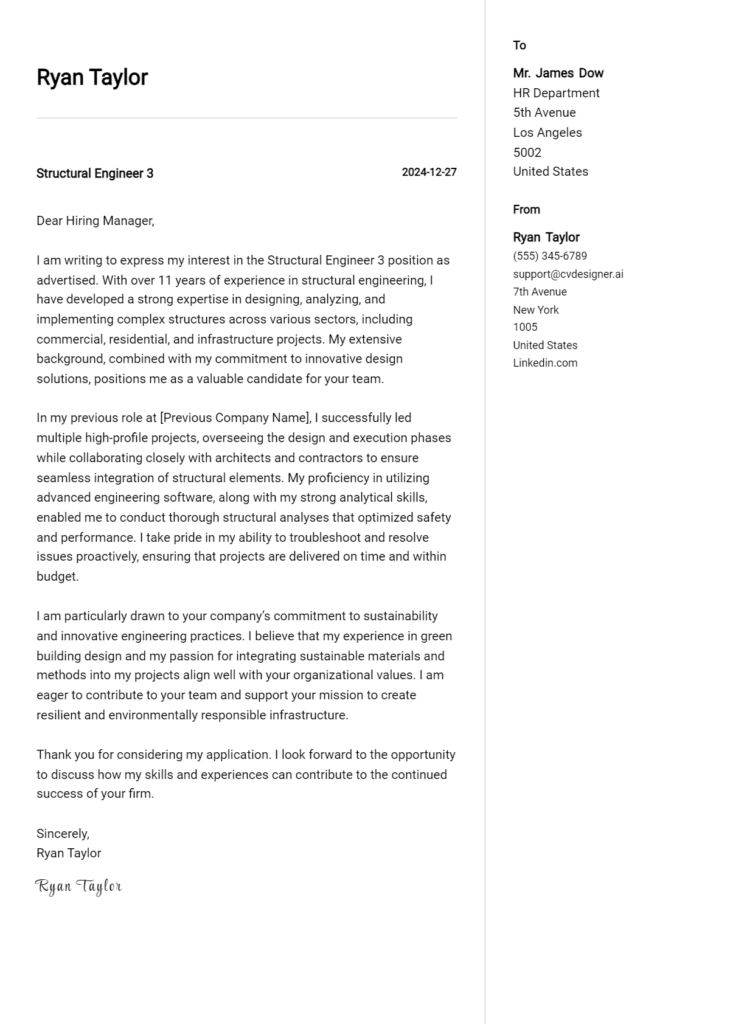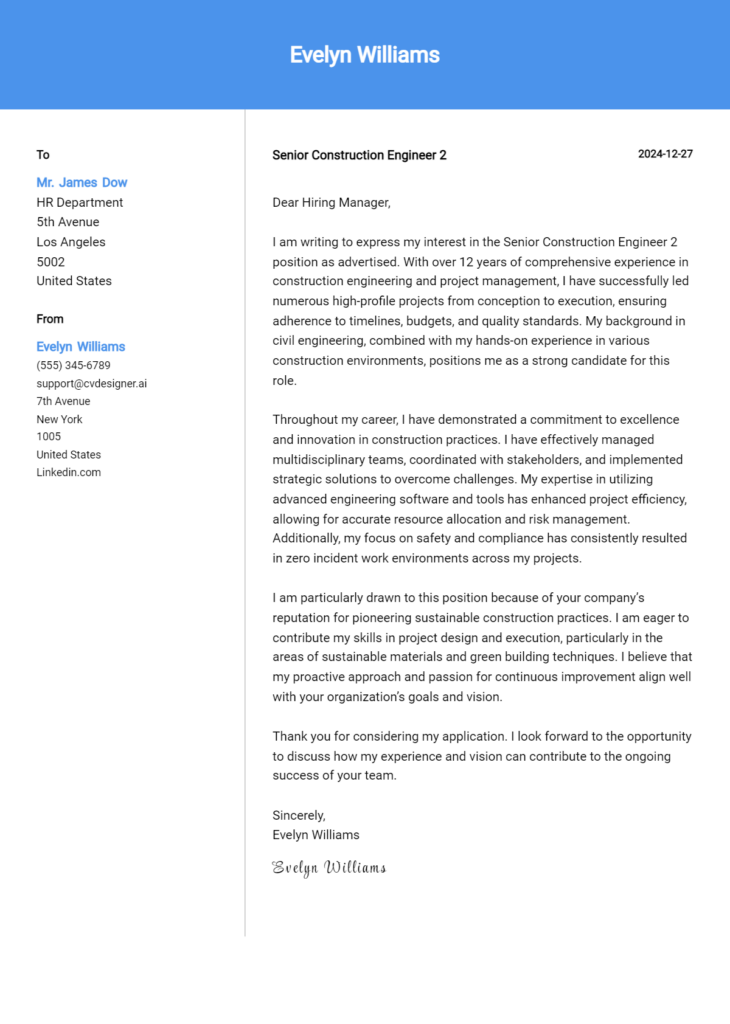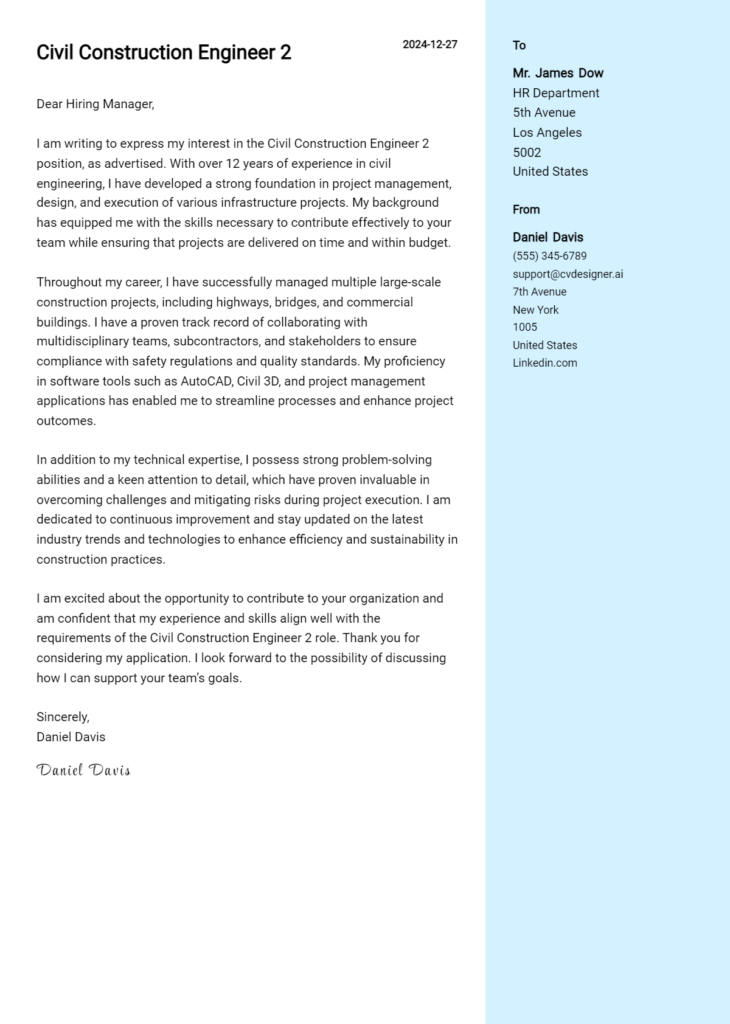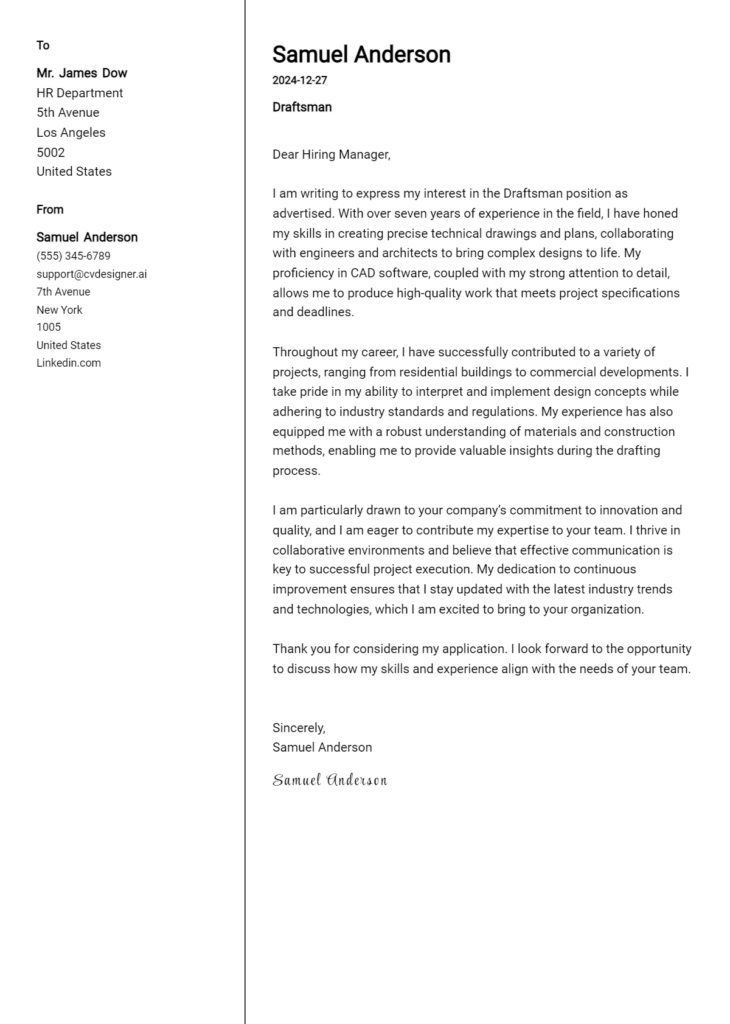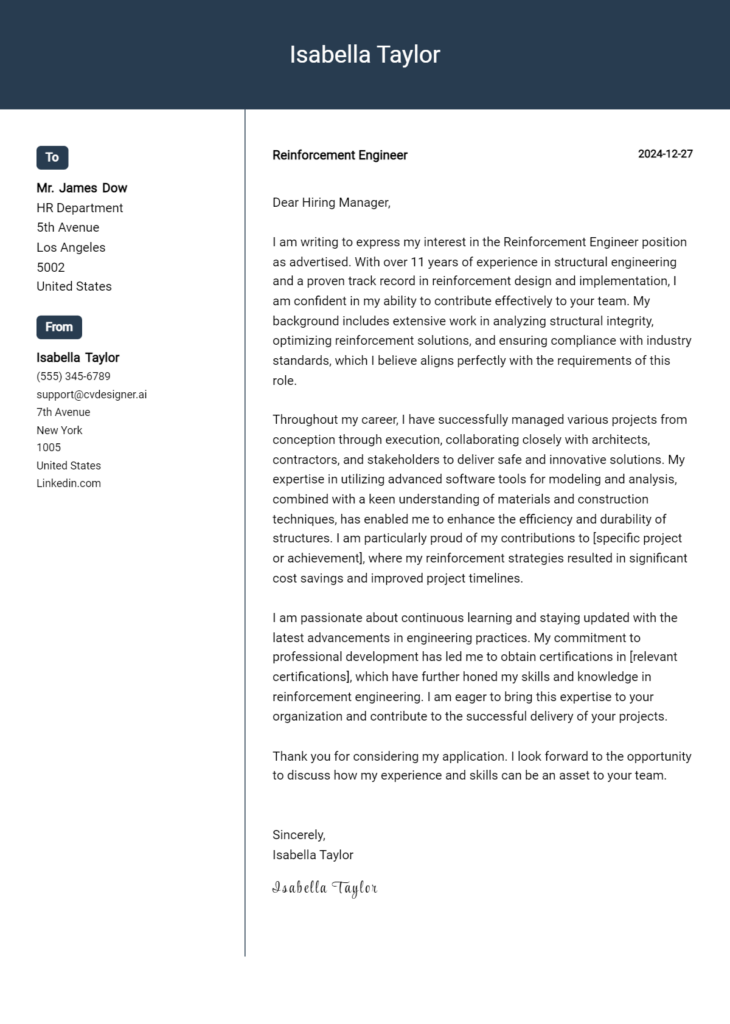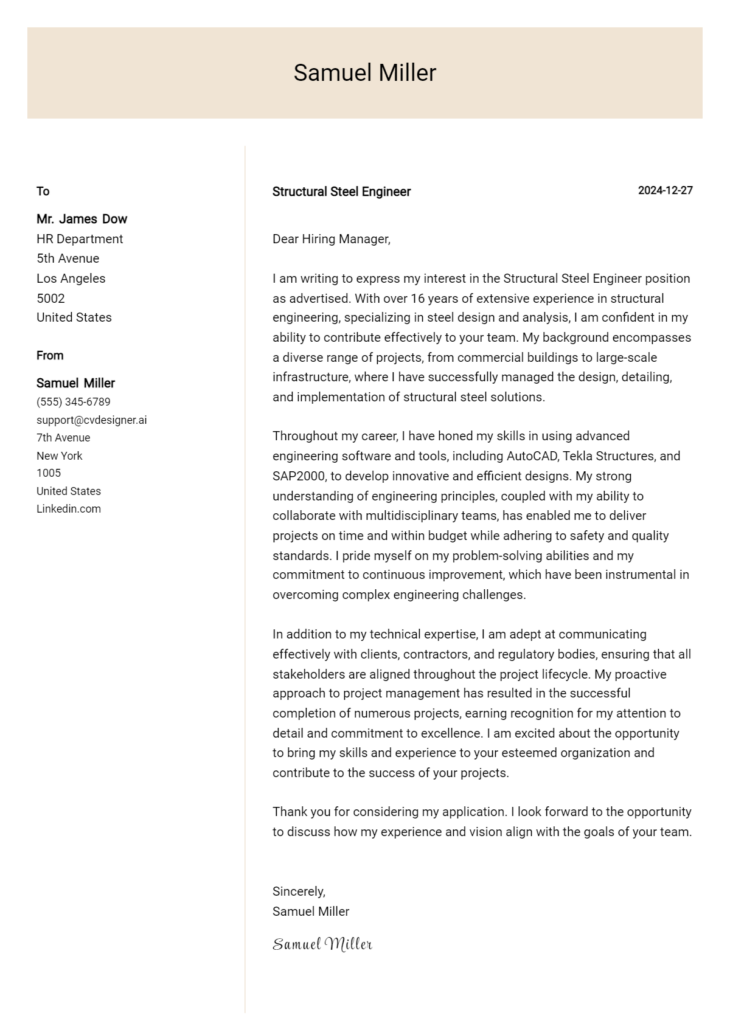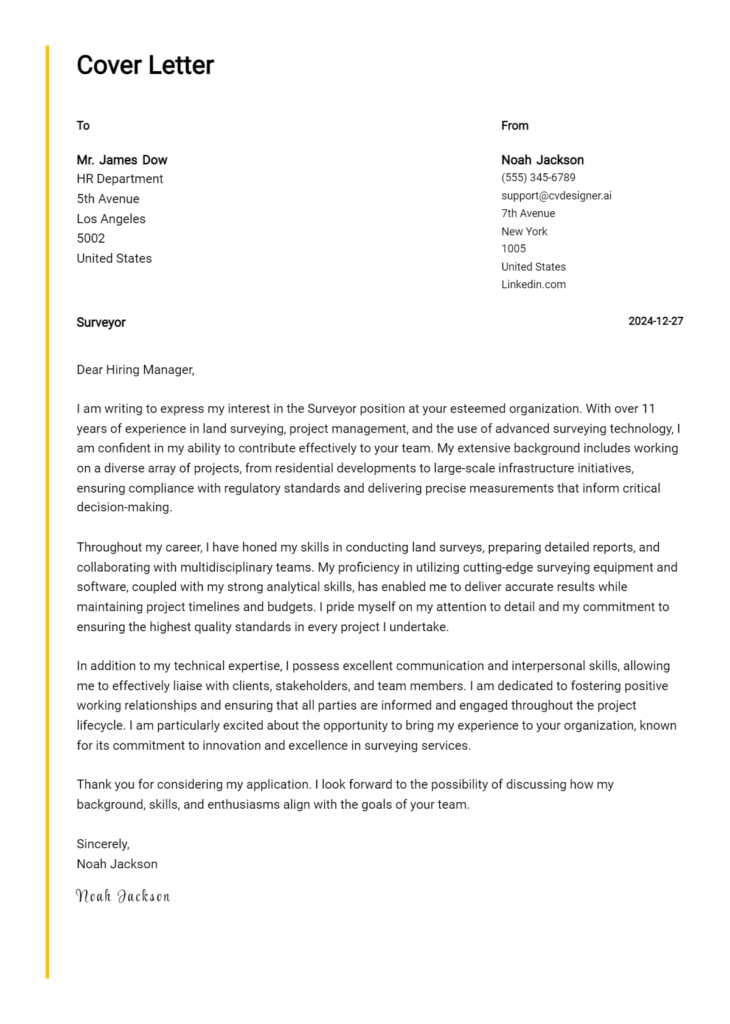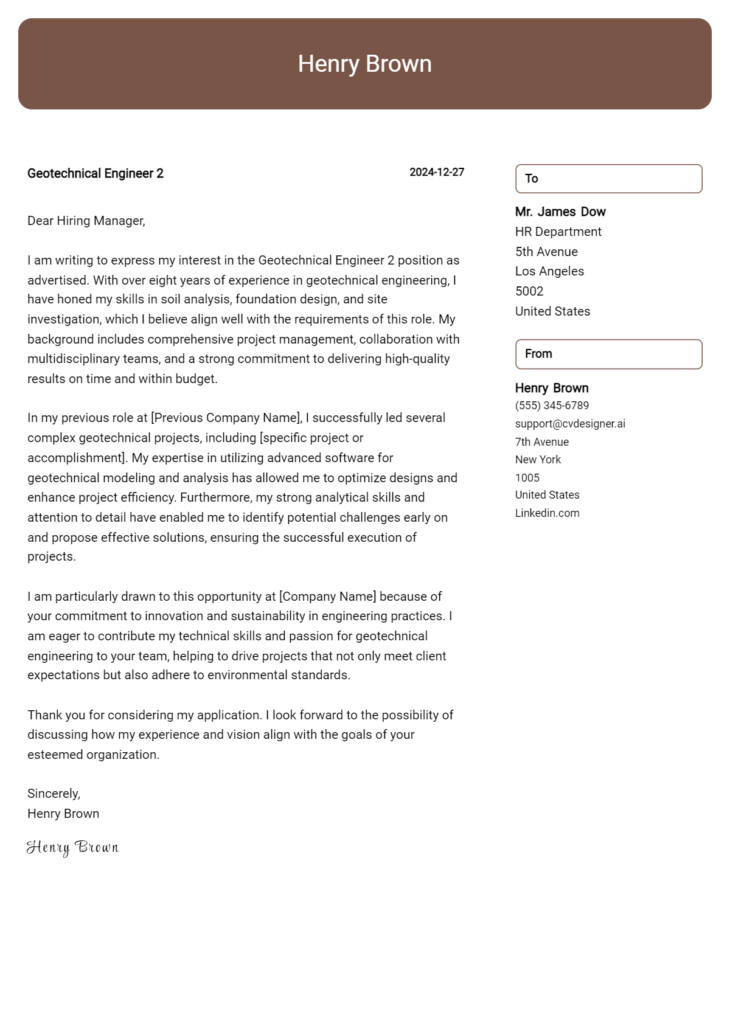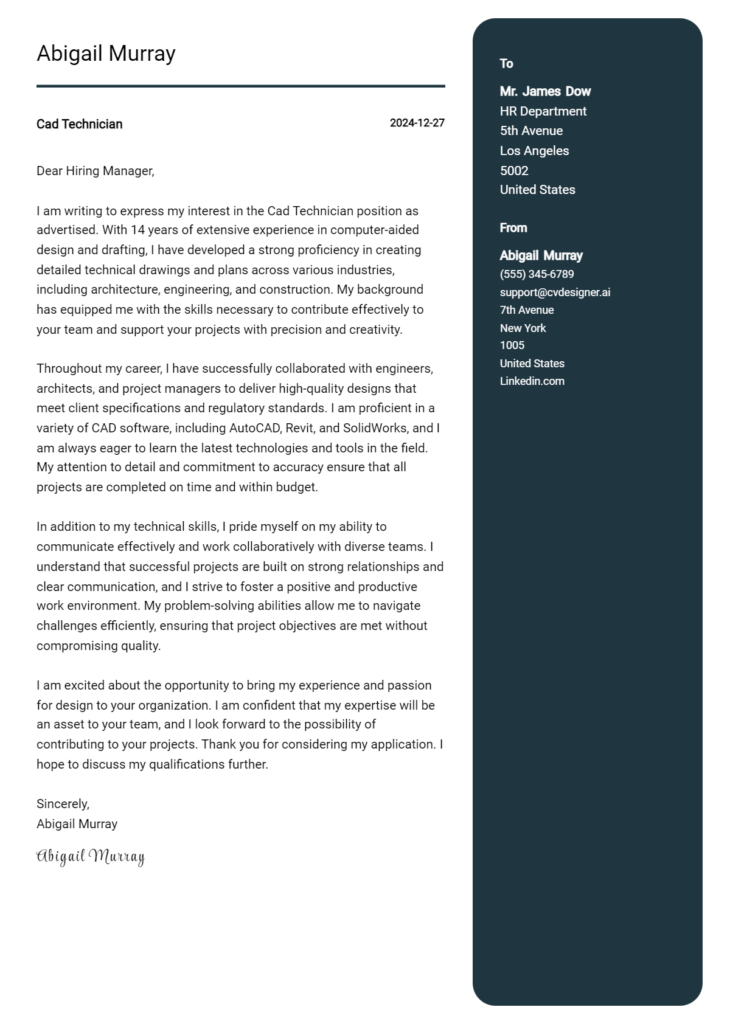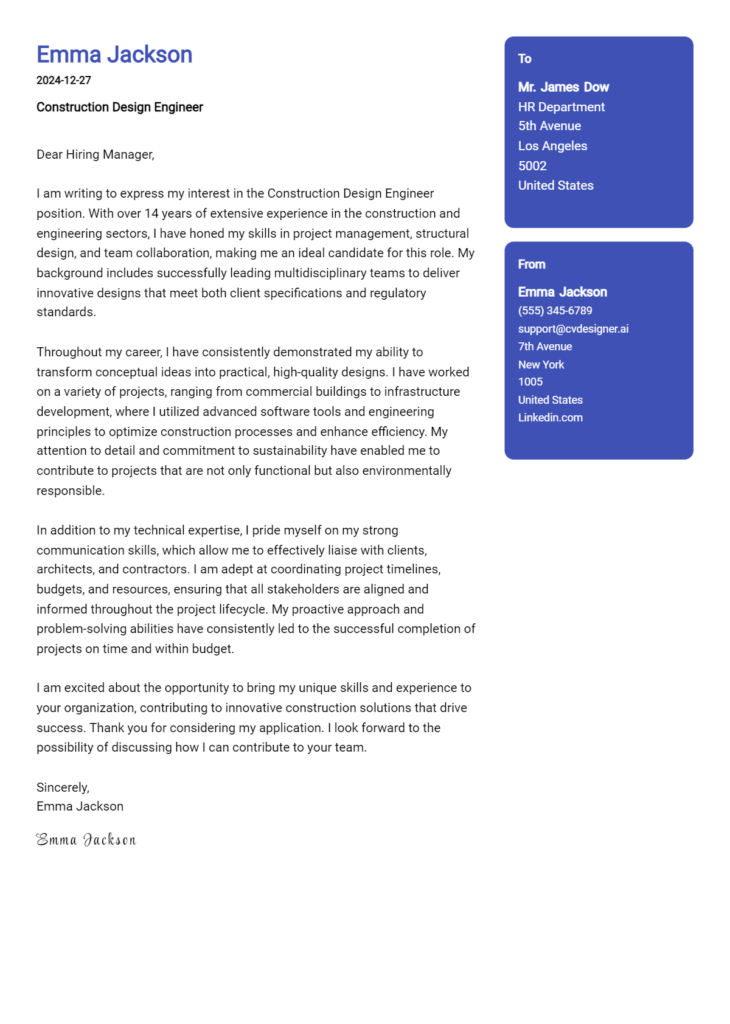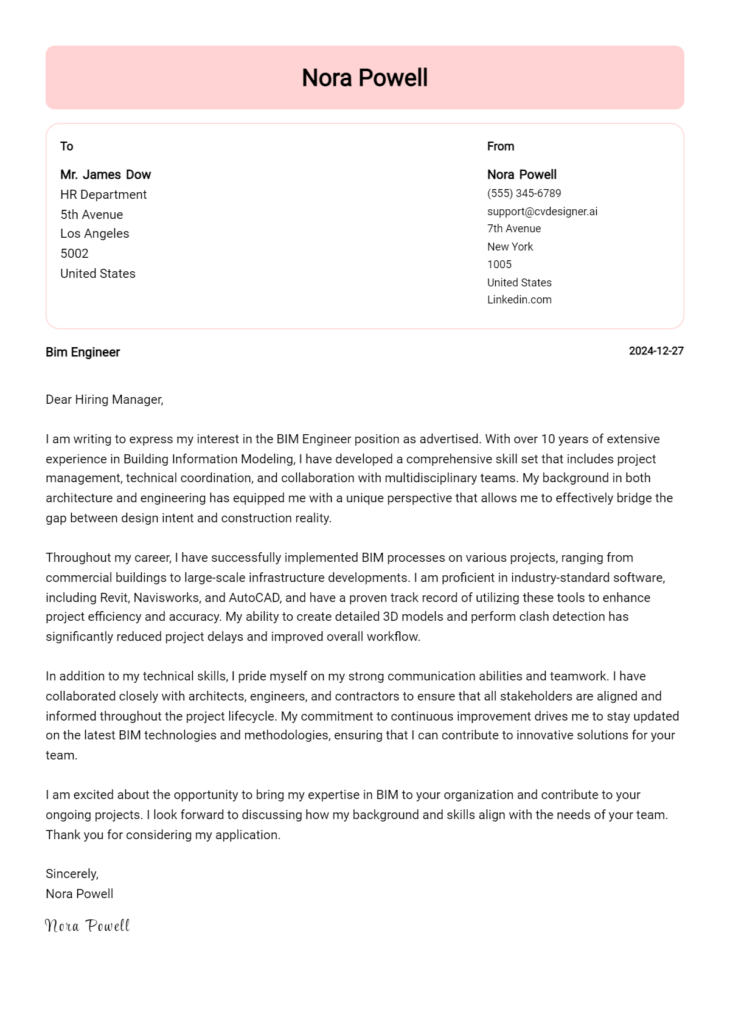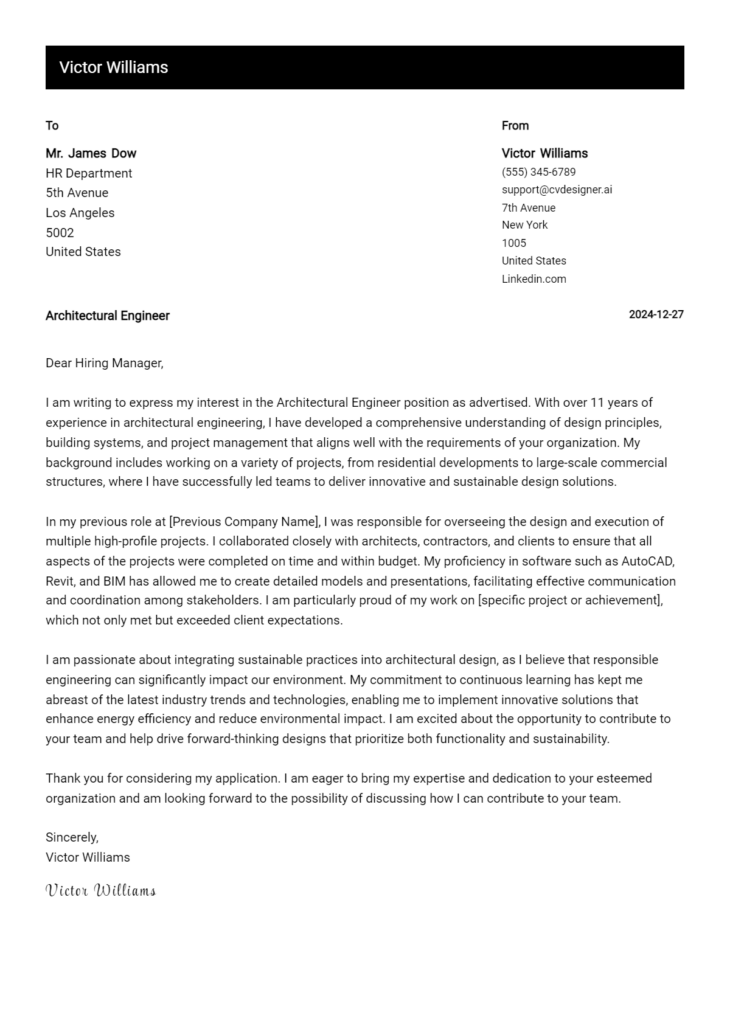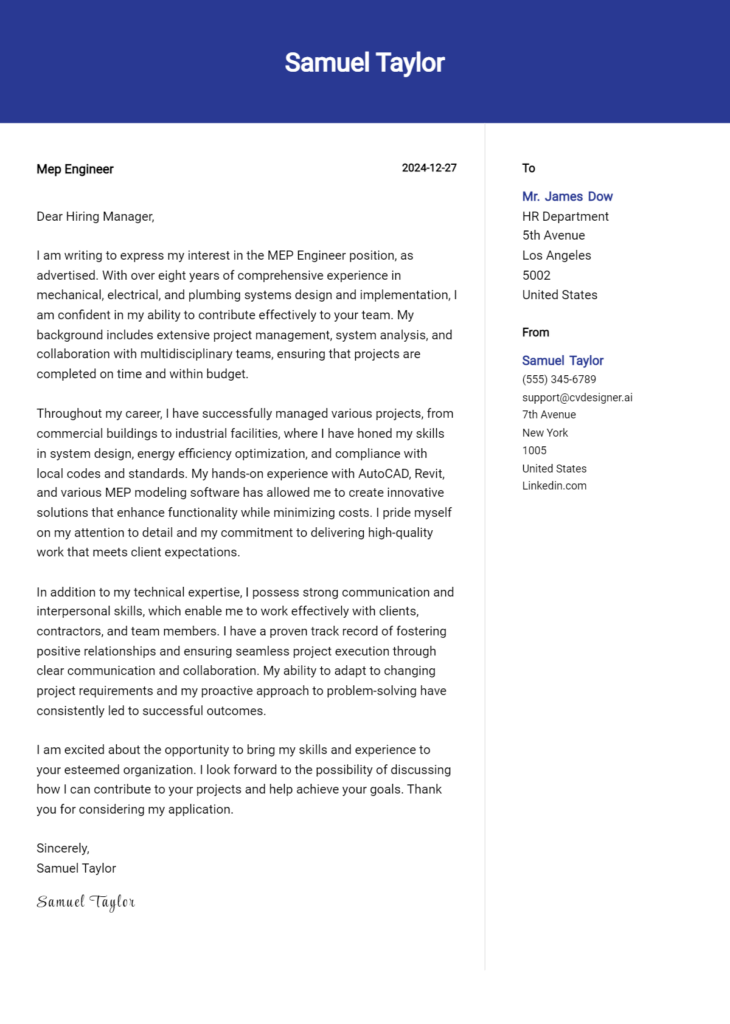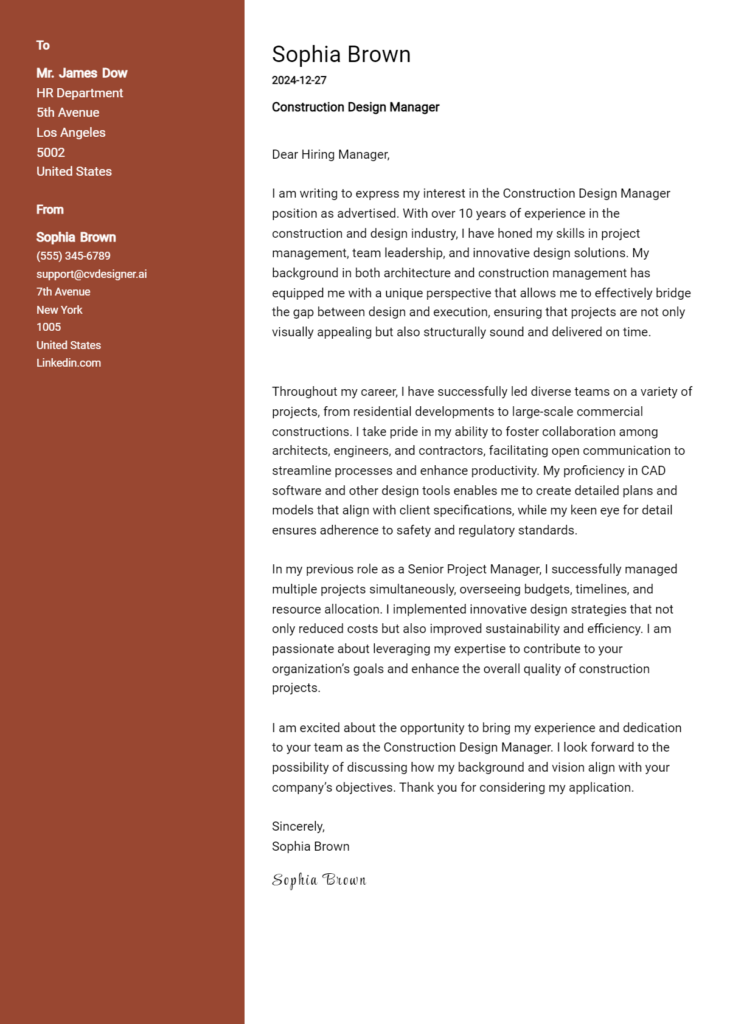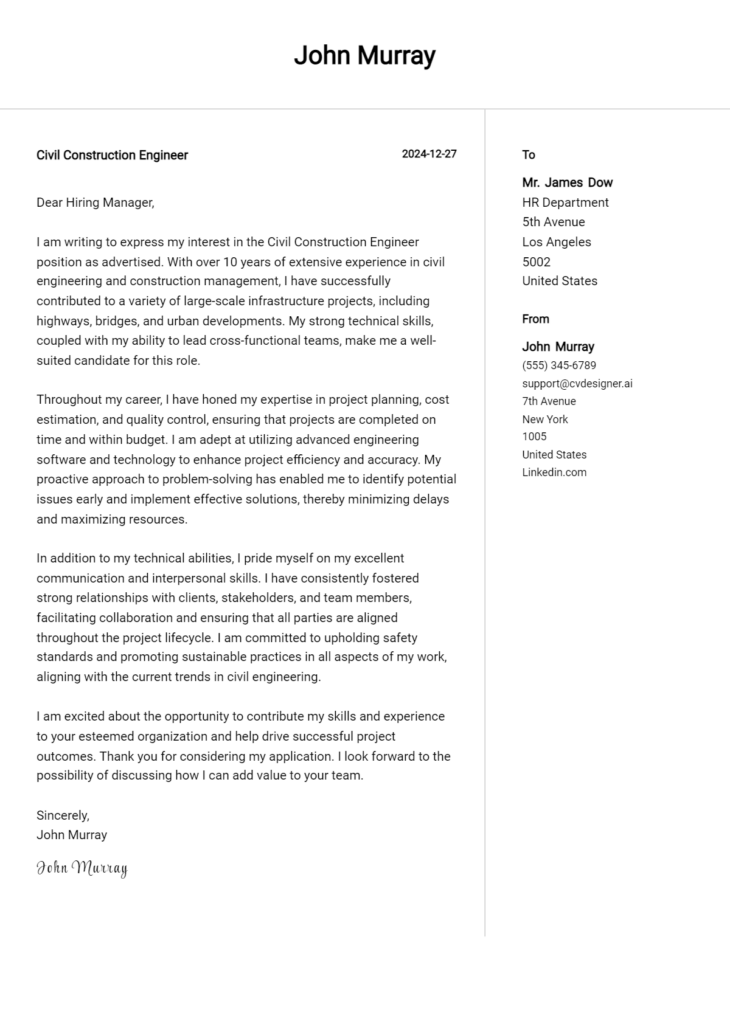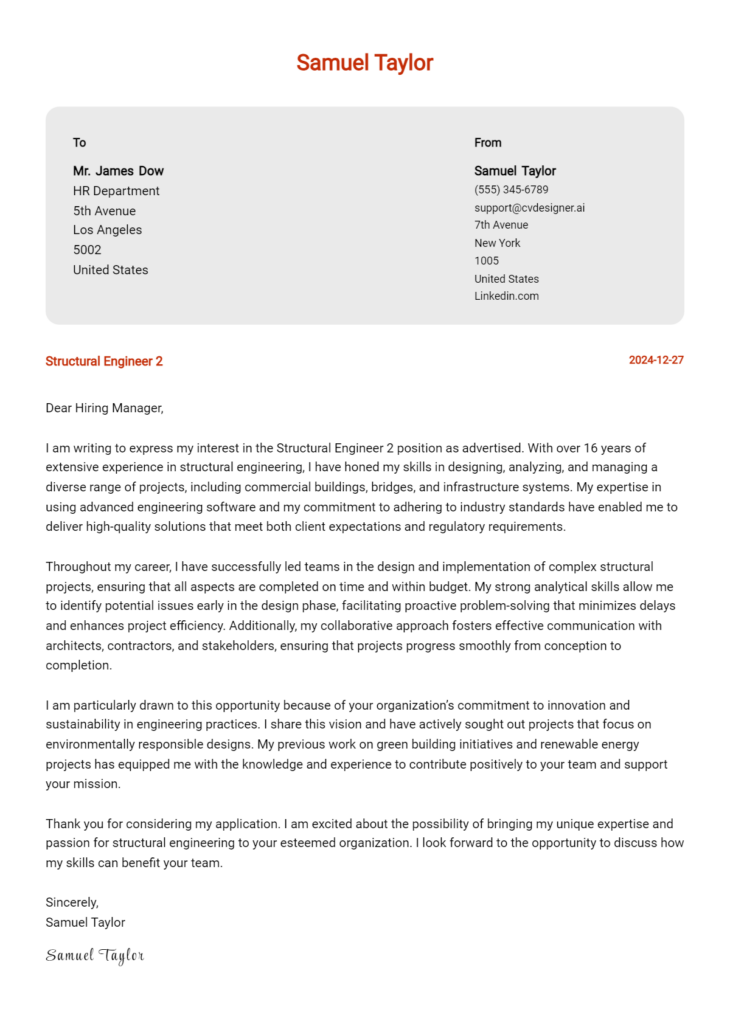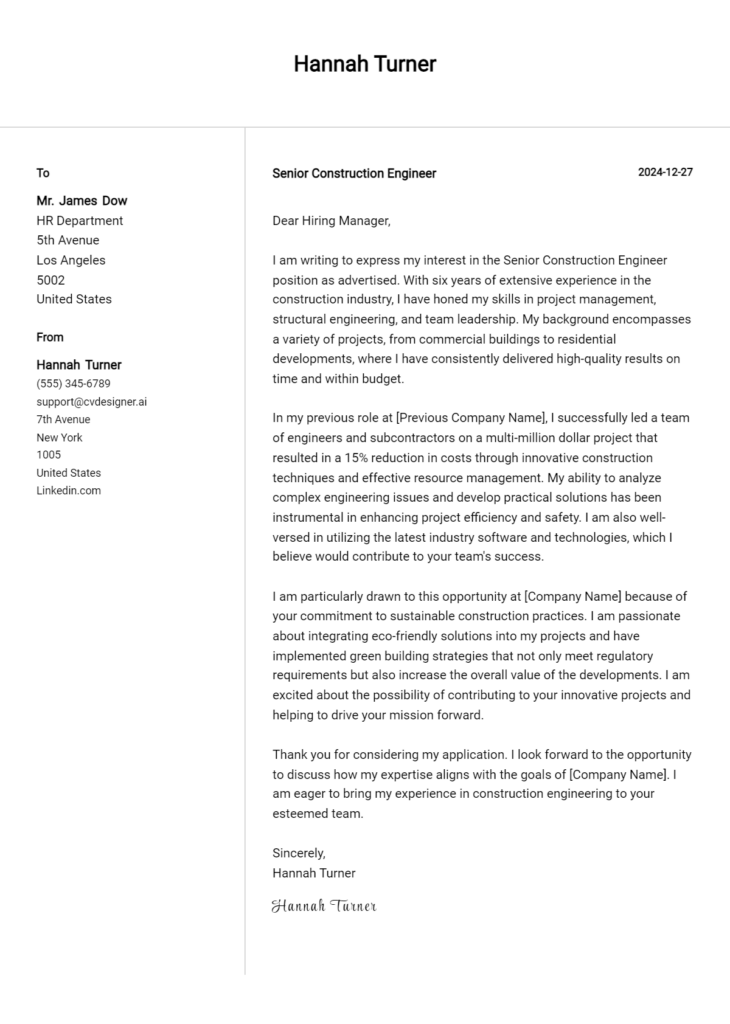Facade Engineer Cover Letter Examples
Explore additional Facade Engineer cover letter samples and guides and see what works for your level of experience or role.
How to Format a Facade Engineer Cover Letter?
Crafting a compelling cover letter as a Facade Engineer is essential for making a strong first impression on potential employers. The way you format your cover letter not only showcases your technical skills but also reflects your organizational abilities and attention to detail—crucial traits in the field of facade engineering. A well-structured cover letter can effectively communicate your unique qualifications, experience, and enthusiasm for the role, setting you apart from other candidates.
In this guide, we will outline the key components of a professional cover letter, ensuring you present your skills in the best possible light.
We will focus on the essential elements of a standout cover letter, including:
- Cover Letter Header
- Cover Letter Greeting
- Cover Letter Introduction
- Cover Letter Body
- Cover Letter Closing
Each section serves a specific purpose in highlighting your expertise and professionalism. Let’s dive into each part and explore how to create an impressive facade engineer cover letter.
Importance of the Cover Letter Header for a Facade Engineer
The header of a cover letter is a critical component when applying for a position as a Facade Engineer. It serves as the first impression to potential employers and sets the tone for the rest of the application. A well-structured header should include your contact information, the date, and the recipient's details, all presented clearly and professionally. This clarity not only demonstrates your attention to detail but also ensures that your application is easily recognizable and accessible to hiring managers. A strong header reflects your organizational skills, which are essential in the field of facade engineering.
Strong Example:
John Doe 123 Engineering Lane Cityville, ST 12345 john.doe@email.com (123) 456-7890 October 10, 2023 Hiring Manager ABC Facade Solutions 456 Design Blvd Architect City, ST 67890
Weak Example:
John D Email: johndoe@email.com 10/10/2023 To Whom It May Concern
The Importance of the Cover Letter Greeting for a Facade Engineer
The greeting of your cover letter serves as the first impression to the hiring manager, making it a critical component in setting the tone for the rest of your application. A well-crafted greeting demonstrates professionalism and adds a personal touch by directly addressing the recipient, which can help establish a connection right from the start. To enhance the effectiveness of your greeting, avoid using generic phrases like "To whom it may concern," and take the time to research the hiring manager’s name if possible. This small effort not only shows your dedication but also indicates that you are genuinely interested in the position.
Strong Greeting Example
Dear Ms. Johnson,
Weak Greeting Example
To whom it may concern,
The Importance of a Strong Cover Letter Introduction for a Facade Engineer
A well-crafted cover letter introduction is crucial for a Facade Engineer as it serves as the first impression for the hiring manager. This introduction should not only capture their attention but also clearly express the candidate’s genuine interest in the role. Moreover, it should briefly highlight key skills or significant achievements that align with the job requirements, setting the tone for the rest of the letter. A compelling introduction can differentiate a candidate from others and provide a solid foundation for showcasing expertise in facade engineering.
Strong Example
Dear [Hiring Manager's Name], As a passionate Facade Engineer with over seven years of experience in delivering innovative and sustainable building envelope solutions, I was thrilled to discover the opportunity at [Company Name]. My recent project, which involved the design and implementation of a cutting-edge facade for a high-rise commercial building, not only enhanced the aesthetic appeal but also improved energy efficiency by 30%. I am eager to bring my expertise in advanced materials and structural design to your esteemed team, contributing to projects that redefine urban landscapes.
Weak Example
Hello, I am writing to apply for the Facade Engineer position. I have some experience in facade design, and I think I would be a good fit for the job. I hope to work with your company and contribute to your projects.
Purpose of the Cover Letter Body for a Facade Engineer
The body of a cover letter for a Facade Engineer serves as a crucial platform to articulate the candidate's technical expertise, relevant experiences, and the unique value they bring to the prospective employer. It should highlight specific projects or accomplishments that demonstrate proficiency in facade design, engineering principles, and collaboration with multidisciplinary teams. By providing concrete examples, the candidate can effectively illustrate their problem-solving abilities and innovation in previous roles, making a compelling case for their suitability for the position.
Strong Example
Dear Hiring Manager, I am excited to apply for the Facade Engineer position at XYZ Company. With over five years of experience in facade design, I have successfully led the implementation of several high-profile projects, including the award-winning Green Tower in downtown. My role involved collaborating closely with architects and contractors to develop sustainable facade solutions that enhanced energy efficiency. For instance, I utilized advanced simulation tools to optimize the building's thermal performance, resulting in a 20% reduction in energy consumption. I am passionate about pushing the boundaries of facade technology and am eager to bring my expertise to your innovative team. Best regards, [Your Name]
Weak Example
Dear Hiring Manager, I am writing to apply for the Facade Engineer position. I have worked in construction for a few years and have some experience with facades. I think I would be a good fit for the job. In my last position, I was part of a team that worked on some projects, but I don't remember the details. I am interested in the position and hope to hear back soon. Sincerely, [Your Name]
Importance of Cover Letter Closing for a Facade Engineer
The closing paragraph of a cover letter is crucial as it serves to summarize your qualifications, reiterate your enthusiasm for the position, and encourage the hiring manager to take the next steps. For a Facade Engineer, this means highlighting your relevant experience and skills in designing and constructing building facades, while also expressing a genuine interest in contributing to the company's projects. A strong closing not only reinforces your candidacy but also leaves a lasting impression, prompting the employer to review your resume and consider scheduling an interview.
Strong Example
Thank you for considering my application for the Facade Engineer position at [Company Name]. With my extensive experience in innovative facade design and a passion for sustainable building practices, I am excited about the opportunity to contribute to your team. I look forward to discussing how my skills align with your needs and would be thrilled to explore this further in an interview. Please find my resume attached for your review. Thank you for your time, and I hope to hear from you soon.
Weak Example
I hope you like my application for the Facade Engineer job. I think I’m a good candidate. Please look at my resume and let me know if you want to talk. Thanks.
Crafting an effective cover letter for a Facade Engineer position is essential in making a strong first impression on potential employers. This document should not only highlight your technical skills and problem-solving abilities but also demonstrate your understanding of the Software Development Life Cycle (SDLC), teamwork, and your commitment to continuous learning in this dynamic field. Here are some tips to help you create a compelling cover letter that will set you apart from other candidates.
Tips for Writing a Facade Engineer Cover Letter
Showcase Your Technical Skills
Begin your cover letter by detailing your specific technical skills relevant to facade engineering, such as proficiency in materials science, structural analysis, and CAD software. Be sure to mention any specialized software you are familiar with, as this can significantly enhance your candidacy. Using cover letter templates can help you format this section effectively.Demonstrate Problem-Solving Abilities
Employers value engineers who can tackle complex challenges. Share a brief example of a challenging project you worked on, focusing on the problems you encountered and the innovative solutions you implemented. This not only showcases your technical prowess but also your critical thinking and adaptability.Highlight Your Knowledge of SDLC
As a Facade Engineer, understanding the Software Development Life Cycle is crucial. Discuss your experience with various phases of the SDLC, particularly if you have worked on projects involving facade design software or tools. Illustrate how your knowledge has contributed to the success of previous projects, emphasizing your ability to integrate engineering principles with software solutions.Emphasize Teamwork and Collaboration
Highlight your experience working in multidisciplinary teams. Provide examples of how you collaborated with architects, structural engineers, and other stakeholders to deliver successful projects. Showcasing your ability to work well with others can demonstrate your value to potential employers who prioritize teamwork.Express a Passion for Continuous Learning
The field of facade engineering is constantly evolving, making it essential to demonstrate a commitment to ongoing professional development. Mention any relevant courses, certifications, or workshops you have completed or are currently pursuing. This will reflect your proactive approach to growth and adaptability in a rapidly changing industry.
By implementing these tips, you can create a standout cover letter that effectively communicates your qualifications and enthusiasm for the Facade Engineer role. Consider using a cover letter builder to streamline the process and ensure your letter is polished and professional.
Common Mistakes to Avoid in a Facade Engineer Cover Letter
Crafting a standout cover letter is essential for a successful job application as a Facade Engineer. Avoiding common mistakes can significantly enhance your chances of making a positive impression. Here are some pitfalls to watch out for, along with tips on how to sidestep them:
Generic Greetings: Using "To Whom It May Concern" can make your letter feel impersonal. Instead, research the hiring manager's name and address them directly.
Lack of Specificity: Failing to mention specific skills or experiences related to facade engineering can weaken your application. Tailor your cover letter by highlighting relevant projects and expertise.
Overly Long Letters: A lengthy cover letter can lose the reader's attention. Aim for a concise format, ideally one page, that focuses on your key qualifications.
Ignoring the Job Description: Not aligning your skills with the job requirements can be detrimental. Carefully analyze the job description and incorporate keywords and phrases that reflect your suitability.
Grammatical Errors: Spelling and grammatical mistakes can undermine your professionalism. Proofread your letter multiple times and consider using tools like Grammarly for assistance.
Failing to Showcase Passion: A lack of enthusiasm for the role can be a red flag. Convey your genuine interest in facade engineering and the company in your letter.
Neglecting a Strong Closing: An ineffective closing can leave a weak impression. End with a strong statement expressing your eagerness for an interview, and include a call to action.
By being mindful of these common mistakes and following best practices, such as those outlined in our cover letter examples and cover letter format, you can create a compelling cover letter that sets you apart as a qualified candidate for the Facade Engineer position.
Cover Letter FAQs for Facade Engineer
What should I include in my cover letter as a Facade Engineer?
In your cover letter, you should include your relevant education, certifications, and experience in facade engineering. Start by introducing yourself and stating the position you are applying for. Highlight specific projects where you've successfully designed or implemented facade systems, demonstrating your technical skills in materials, structural integrity, and energy efficiency. Mention any software proficiency, such as AutoCAD or BIM, that is pertinent to the role. Additionally, express your understanding of the company's projects and values, and how your background aligns with their mission. Conclude with a strong closing statement that invites further discussion.
How can I showcase my technical skills in my cover letter?
To effectively showcase your technical skills in your cover letter, provide concrete examples of your work that demonstrate your expertise. Discuss specific facade materials you have experience with, such as glass, metal, or composite materials, and elaborate on how you've used them in past projects. Mention any relevant software tools you are proficient in that aid in facade design and analysis. If applicable, include quantifiable results from your work, such as improved energy efficiency or project cost savings. This detailed approach not only highlights your skills but also reflects your ability to contribute to the prospective employer's projects.
How do I tailor my cover letter for a specific job application?
To tailor your cover letter for a specific job application, start by researching the company and its projects, understanding their design philosophy and values. Use this information to align your experience and skills with their needs. Customize your introduction to reflect your enthusiasm for the specific position and the organization. Highlight relevant experiences that parallel the job description, focusing on projects or roles that closely match the responsibilities listed. Additionally, use keywords from the job posting to demonstrate your attention to detail and genuine interest in the position. A personalized cover letter shows prospective employers that you are committed and well-suited for their team.
What common mistakes should I avoid in my cover letter?
When writing your cover letter, avoid common mistakes such as generic language and lack of specificity. Failing to address the hiring manager by name or using a generic salutation can create a poor first impression. Additionally, avoid restating your resume; instead, use the cover letter to expand on key experiences and accomplishments. Steer clear of lengthy paragraphs—opt for clear and concise sentences that maintain the reader's interest. Grammatical errors and typos can undermine your professionalism, so be sure to proofread carefully. Lastly, ensure that your enthusiasm for the role and the company is evident, avoiding a tone that comes across as overly formal or disinterested.
Build your Cover Letter in minutes
Use an AI-powered cover letter builder and have your letter done in 5 minutes. Just select your template and our software will guide you through the process.

